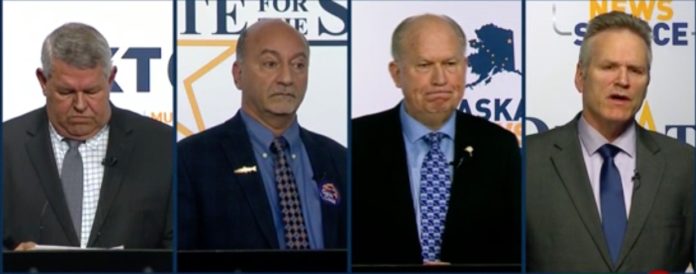The ranked choice voting scheme created by Ballot Measure 2 in 2020 has brought a new set of challenges, including an extremely compressed timeframe for the incoming governor.
Rather than having a sense of certainty within a couple of days after the election (barring a close race), and thus putting a transition team in place, it could be three weeks before the next incoming governor knows where he stands. The General Election won’t have the books closed on it until Nov. 23 and will not be certified until Nov. 29. If a candidate wants to challenge the results, he will have until Dec. 4 to do so.
The winner takes office the next day — Dec. 5 at noon.
Because Democrat Les Gara and Bill Walker, the politically homeless man, are running essentially a combined campaign at this point, they could each conceivably end up with about 25% of the vote, and both could say that they will be the winner with the other man’s 25%+1 second votes. If Gov. Mike Dunleavy has 47% of the vote on the first round, there is the chance that either Gara or Walker could win by scooping second place votes.
While this doesn’t appear likely, it is technically possible voters won’t know who won for weeks.
Who, then, gets awarded the transition office in the Atwood State Office Building next week? Usually, the transition team is announced within days by the incoming governor, and the state provides the office space and funding for the transition to the governor-elect. In the event of an incumbent winning, there is no transition team.
This year there is little evidence that either Democrat Les Gara or Bill Walker are seriously working on transition teams. As the election gets closer, and as polling data gives clues to how a candidate is doing, the candidate who believes he is winning typically starts making phone calls to ask people to submit their resumes and to find out who wants to be on the governor’s team and in the cabinet.
Gara and Walker could demand keys to the Atwood and office space, phones, computers, and copy machines, but that would be a presumptuous move in this era of ranked choice voting. The chances are they will just fold up their campaigns and go home.
Another kink is that the new governor must have his budget filed with the Legislature by Dec. 15, which gives him 10 days after he is sworn in, but usually a governor-elect knows weeks earlier and will start getting budget briefings.
For Gov. Mike Dunleavy, who many believe will win reelection, the budget team has already been working on its 2024 budget and is putting finishing touches on it now. But if either Les Gara or Bill Walker win, they would be stuck with the current budget, which they would file a supplemental budget by February for the Legislature’s consideration.
The political calendar:
Nov. 8: Election Day ends at 8 pm
Nov. 10: Questioned Board begins review of questioned ballot envelopes
Nov. 18: Deadline to receive absentee ballots mailed from within the U.S., U.S. territories of Puerto Rico, Guam, the Virgin Islands, and American Samoa
Nov. 23: Deadline to receive by-mail ballots mailed from overseas addresses
Nov. 23: Final regional count of Absentee and Questioned ballots
Nov. 23: The elimination of write-ins, fourth-place and third-place finishers if needed, and tabulate final results by 4 pm
Nov. 29: Target date to certify the General Election
Dec. 4: Final day to request a recount for governor/lieutenant governor
Dec. 5: Governor is sworn in at noon
Dec. 15: Budget due to Legislature for Fiscal Year 2024
Jan 17, 2023 – First day of legislative session
Jan 31, 2023 – 15th day of session, supplemental bill introduced
Feb 15, 2023 – 30th day of session, governor’s amended budget introduced
April 16, 2023 – 90th day of session, statutory end of session
May 17, 2023 – 121st day of session, constitutional end of session if extended
